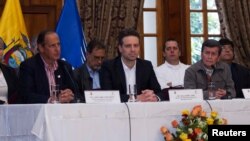Colombia's second largest rebel group, the ELN, is ready to call a bilateral ceasefire with the government while they negotiate an end to five decades of war, a guerrilla negotiator said on Tuesday.
The government and the National Liberation Army (ELN) will begin formal peace talks in Ecuador on Feb. 7, once the insurgent group frees a kidnapped politician and authorities pardon two jailed rebels.
The sit down will end three years of back and forth between the two sides and hopefully stop a conflict that pit leftist rebels against right-wing paramilitaries and the military, killing over 220,000.
President Juan Manuel Santos was awarded the 2016 Nobel Peace Prize for his efforts after negotiating peace with the Revolutionary Armed Forces of Colombia (FARC), the nation's biggest rebel group.
"We are willing to have a bilateral ceasefire from the beginning," ELN negotiator Aureliano Carbonell told Reuters in a telephone interview from Ecuador.
"That would help create another climate to the peace process; send the nation a positive message."
Carbonell is not a well-known ELN commander and he declined to provide personal details.
Juan Camilo Restrepo, chief government negotiator, has said he will seek a "de-escalation" of the conflict.
An early bilateral ceasefire would contrast with the FARC talks, which stretched for four years in Cuba and were conducted mostly amid fighting and bomb attacks. A bilateral ceasefire was called in the final stages of talks.
Carbonell said the ELN, which has battled a dozen governments since it was founded in 1964 and is considered a terrorist group by the United States and European Union, would allow former President Alvaro Uribe's participation in the talks.
"We agree that Uribe, or a representative, participates at the negotiating table. Peace is made with adversaries and Uribe leads the biggest war mongering sector."
Uribe is the strongest opponent of the FARC accord and demands that rebel commanders are jailed for their crimes.
Both the ELN and the FARC funded their operations from drug trafficking, extortion and kidnapping. The ELN has engaged in repeated attacks against oil installations, as well as combat.
Inspired by the Cuban revolution and established by radical Catholic priests, the ELN has about 2,000 fighters.
Carbonell said that agreeing the six-point peace accord may take time, but the ELN is willing to continue talks with a new government if things are not concluded when Santos leaves office next year.





